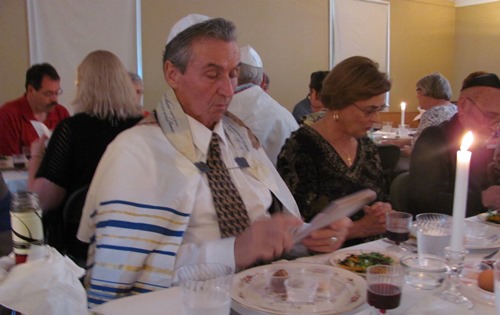The Christian Seder Meal as Sacrament and Precursor to the Fulfillment of Romans 11
That began to turn around as the world saw the details of the Nazi extermination camps and the statistics of the Holocaust. Further, many Christians discerned that the foundation, and miraculous survival, of the state of Israel (1948) in spite of its many enemies was the working out of Biblical prophecy. In any case, I cannot remember a single incident as a charismatic Christian since the 1970s of every hearing an anti-Semitic slur or nasty joke within Christian circles. Rather, Christians, especially Spirit-filled Christians, now regularly pray for Israel and for the “peace of Jerusalem” as we are commanded to in the Bible.[6] Modern Christian saints such as Corry Ten Boom, are remembered for their heroism in shielding Jews from Nazi persecution and extermination.
 This reconciliation is not just one way. Jewish scholars have taken a radical turn in the last decades towards appreciating Christianity. For instance, in traditional rabbinic literature Paul was considered the great apostate of Judaism and his writing the source of the pogroms and persecutions that befell the Jews at the hands of Christians. But recently this view has changed. Jewish scholars now give Paul a new and positive evaluation. That is, the Pharisees of the New Testament times tried to convert the world and bring to it the good news of a One God who was righteous, loving and forgiving. Where they failed, Paul succeeded. He indeed brought the worship of the one true God to the Gentiles. In this view Christianity, with is strange Trinitarianism, is an “interim” solution to end idolatry. But in God’s providence God will be universally worshiped and the Torah obeyed.[7]
This reconciliation is not just one way. Jewish scholars have taken a radical turn in the last decades towards appreciating Christianity. For instance, in traditional rabbinic literature Paul was considered the great apostate of Judaism and his writing the source of the pogroms and persecutions that befell the Jews at the hands of Christians. But recently this view has changed. Jewish scholars now give Paul a new and positive evaluation. That is, the Pharisees of the New Testament times tried to convert the world and bring to it the good news of a One God who was righteous, loving and forgiving. Where they failed, Paul succeeded. He indeed brought the worship of the one true God to the Gentiles. In this view Christianity, with is strange Trinitarianism, is an “interim” solution to end idolatry. But in God’s providence God will be universally worshiped and the Torah obeyed.[7]
Further, generations of enthusiastic Christian pilgrims to the Holy Land have softened Jewish memories of past Christian pogroms and persecution. Israeli leaders are acutely aware that Evangelical and Spirit-filled Christians are steadfast in their support of Israel. This is in contrast to the rapid rise of pro-Palestinian sentiment and a renewed anti-Semitism so marked in Europe, and now common within mainline (liberal) Protestantism.
Romans 11 and Paul’s Vision of the Reconciled Christian/Jewish Church
When Paul wrote to the congregation at Rome, it consisted of both Gentile believers and Jewish/Christians. He gave his fullest revelation about the interaction of Jews and Christians in the Body of Christ in chapter 11. It was a vision far different from the anti-Semitism and supersessionism (the idea that the Church replaced Israel) that captivated the Early Church less than a hundred years after his death, a theological teaching that remained dominant until recent times.
The rabbinic theology of the “end times” that Paul’s learned was that Kingdom of God and the Messiah would come after Jews fully embraced the Law of Moses. This would usher in a period when Gentiles would stream into the Kingdom in envy and awe of Jewish righteousness and the excellence of the Law. Paul’s revelation of Jesus as the Messiah reversed this. The heart of the Kingdom was not obedience to the Law of Moses, rather God’s providential mercy and grace thru Jesus. The non-legalistic righteousness of the Christian Gentiles would make the Jews envious and ready to accept the Gospel.[8]
Category: Ministry, Summer 2016


